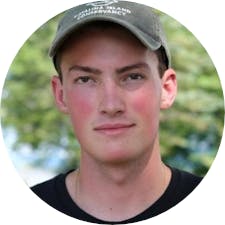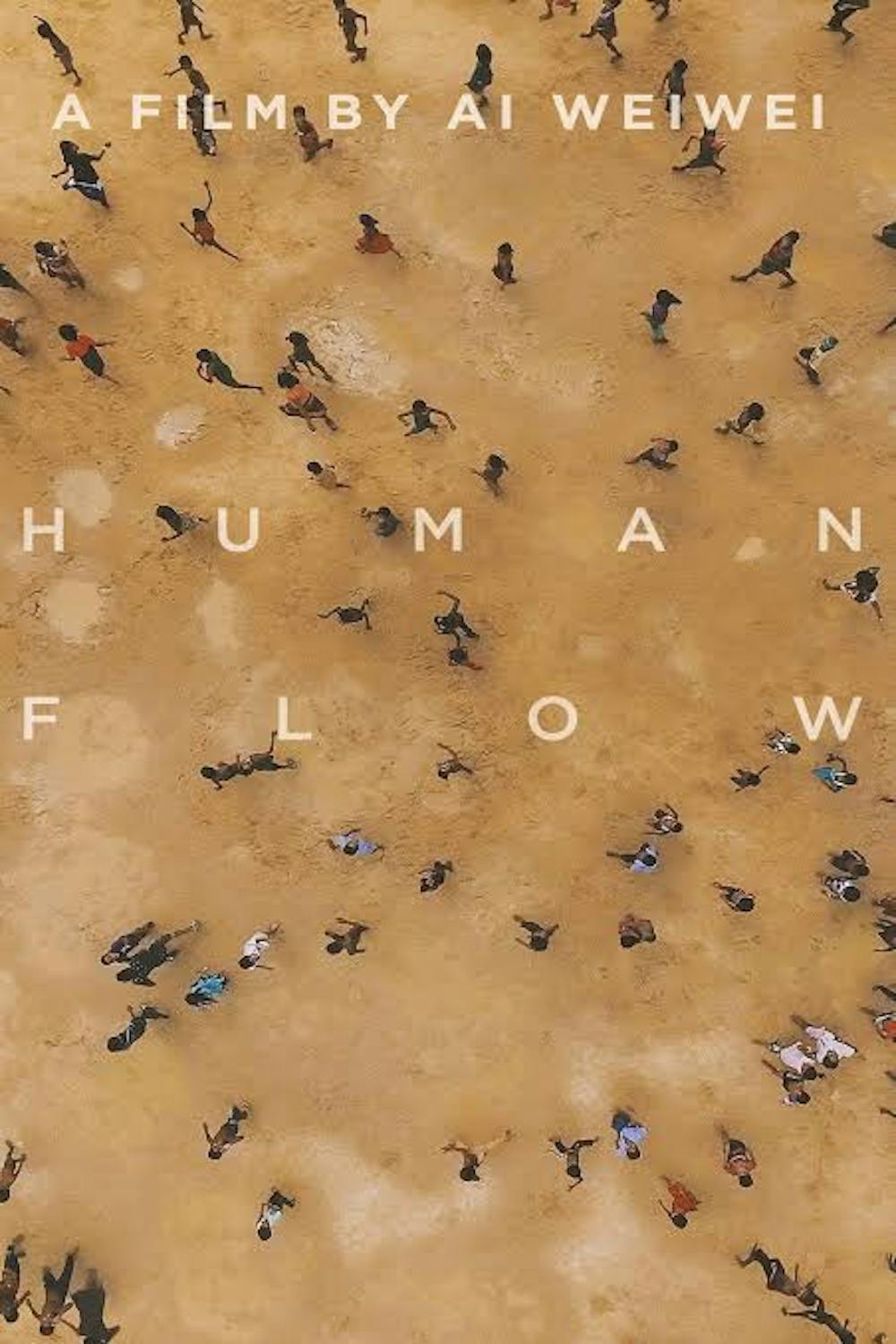On the plush red seats of Axinn 232, attendees perched last week for a screening of “Human Flow,” Ai Weiwei’s 2017 visual exploration of human displacement. Co-sponsored by the Middlebury College Museum of Art and Middlebury History of Art and Architecture department, the event drew a mix of community members and students seated inconspicuously at the back of the room.
Douglas Perkins ’94, associate director of operations and finance at the Museum of Art, introduced the film, and at 7 p.m., to the mechanical whirr of lowering window shades, pressed play. Middlebury last screened “Human Flow" in March 2022.
“Human Flow” is a powerful documentary that floats across 23 countries, offering an atypical view of human migration. Over the span of a year, the filmmakers captured scenes of urgency and desperation.
A constant presence in the film, Ai puts forth an unnarrated reflection of the challenges of migration faced by over 65 million people around the world. “Human Flow” relies exclusively on footage shot exclusively by Ai and his team, beginning with a serenity that contravenes the violence of the documentary’s focus. With a decisive flow characteristic of the artist’s previous work, the film slips between tranquility and chaos as placid landscapes are contrasted with refugee camps and the terror accosting those who inhabit them.
Born in August 1957 in Beijing, Ai is a contemporary artist, documentarian and activist. He began his career in the northwest of China and was outspoken against the Chinese government’s approach to democracy and human rights, leading to his arrest in 2011 and detainment for 81 days without charge, according to the Guggenheim museum’s website. Both a controversial and highly-influential figure, Ai’s sculptures, photographs and public works have been displayed in galleries around the world.
Ai has balanced activism and social critique throughout his career as a contemporary artist, and “Human Flow” serves as a distressing reminder of the extent of human displacement. The project functions as a humanizing agent, providing a window into oft-overlooked populations who have been forced from their homes due to political violence, social persecution, or environmental threats.
In Greece and Serbia, the filmmakers explore the increasing militarization of national borders. From Jordan to southern Italy, day-to-day life in a refugee camp is detailed through accounts from the families who live there. Through revealing interviews and a blend of aerial and handheld footage, the film offers powerful insight into the lives of those searching for peace.
Contemplating forces of good in the face of crisis, Ai sheds light on global leaders and humanitarian workers whose work has been well-received. In Jordan, attention is given to efforts to create a haven for Syrian refugees at the Zaatari camp. At Berlin’s Tegel airport, around 5,000 refugees and asylum seekers are currently being housed. The underlying message in “Human Flow” is one of desperation; while humanitarian aid is present, it is far from enough.
“Human Flow” is purposeful in displaying not only the mud and disease that festers in refugee camps, but also the determined spirit of their inhabitants. By showing joyful conversations and images of retained childhood innocence, the documentary highlights moments of levity in struggle.
Each of the featured groups in “Human Flow” is escaping a unique threat. The film lingers in Bangladesh where nearly half of Myanmar’s Rohingya population arrived, fleeing genocide in their home nation which began in 2017.
In Kenya, drought has forced thousands of people from their homes. By 2030, it is estimated that as many as 700 million Africans will be displaced due to high water stress. As resources dwindle, the global refugee crisis worsens.
Monday’s screening of “Human Flow” can be contextualized by its indisputable current relevance. In 2022, operations at Berlin-Tegel Airport expanded to accommodate an influx of refugees from Ukraine. Ukrainian refugees continue to live in uncertainty about their futures, with Feb. 24 marking two years since Russia’s full-scale invasion of the country.
Some members of the audience nodded in recognition as the film shifted its focus to Gaza and a group of young women who spoke of being forgotten by the world. As of the film’s release in 2017, more than 4.7 million Palestinians resided in Gaza and the West Bank. Today, Palestinians are the largest refugee population in the world at nearly 6 million, and Gaza is uninhabitable, according to the United Nations. Israel has faced accusations of genocide amidst a growing humanitarian crisis.
“It’s strange to grapple with, being a student and knowing that I’m going to go back to my room and do homework,” attendee Marlow Saucier ’24 said. “It’s distressing.”
The scenes of migration challenges depicted in Ai’s film will continue to worsen if major action is not taken. According to the United Nations, there were approximately 108 million displaced people worldwide at the end of 2022, 40% of whom were children under the age of 18. Almost 400,000 children are born as refugees per year, the same United Nations data states.
As the film credits rolled, heads bowed in a brief silence. Then, the projector whirred to a stop, the window shades were raised to let in the late afternoon light, and the room emptied without applause.

Charlie Deichman-Caswell ’24 (he/him) is a Photo Editor and Contributing Writer.
Charlie is an Environmental Studies major with a concentration in Anthropology, and French minor. He enjoys athletic activities such as climbing and soccer, as well as other hobbies like photography and creative writing. In his spare time, he enjoys hiking and spending time outdoors with friends, reading, watching movies, and generally chilling out.




